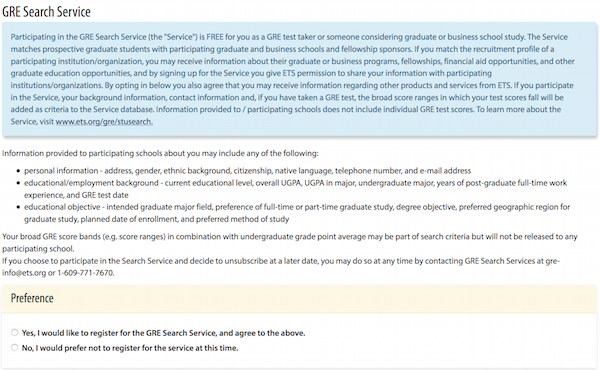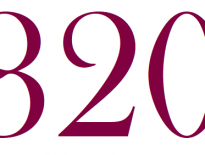
Know what you want to go to grad school for, but aren’t sure which schools are out there that match your needs and academic level? To help students learn more about what different grad programs are out there, the ETS offers the GRE Search Service to connect you with grad programs and business schools after you’ve taken the GRE.
Learn more about how to sign up for the GRE Search Service and what you might get out of it with this article.
Feature image credit: Alex Neuhoff/Flickr
What Is GRE Search Service?
The GRE Search Service allows graduate and business schools to identify students whose test scores and other characteristics make them good candidates for the schools’ programs and market to them.
Operated by ETS (the same company who administers the GRE), the GRE Search Service is free for all test takers to sign up for. Once you sign up for it, your test scores and any other data you’ve given to ETS are entered into the GRE Search Service database.
On the other end of things, grad and business schools create recruitment profiles that describe what kinds of prospective students they want to contact. These recruitment profiles allow schools to sort for potential students based on:
- Demographics (age, gender, race/ethnicity, etc.)
- Geographic location of the student
- Educational objectives. These include what degree you want to get, what subject you want to get it in, and when you plan to begin grad school.
- Undergraduate GPA and GPA in undergraduate major(s).
- Score band for the GRE General test. For example, if you got a 154 on Quant and a 151 on Verbal, you’d fall into the score band of 150-155 points.
- (If applicable) Score band for any GRE Subject Tests you’ve taken. For example, if you got a 610 on the Psychology GRE Subject Test, you’d fall into the score band of 600-690 points.
If the information you’ve given to ETS matches all or some of a school’s recruitment profile, that school will get your name and email address. They will not, however, get specific information on what your exact GRE scores are. For instance, a school may see that you scored in the 150-155 GRE score band for Quant and Verbal, but it won’t know that you got a 154 Quant and a 151 Verbal score.
Quick side note: we've created the world's leading online GRE prep program that adapts to you and your strengths and weaknesses. Not sure what to study? Confused by how to improve your score? We give you minute by minute guide.
You don't NEED a prep program to get a great GRE score. But we believe PrepScholar is the best GRE prep program available right now, especially if you find it hard to organize your study schedule and don't know what to study.
Click here to learn how you can improve your GRE score by 7 points, guaranteed.
How Do You Sign Up for GRE Search Service?
You can sign up for GRE Search Service at three different points in time: while you’re registering, when you’re taking the test, and at any point after the test.
The first chance you’ll get to sign up for the GRE Search Service is when you register online to take the GRE. You’ll start your registration by entering in the personal information needed to register for the GRE:

Once you’ve done this, you’ll continue on to the GRE Search Service section of registration. At this point, you’ll have the option of whether or not to sign up for the GRE Search Service:

If you choose not to sign up for the GRE Service at this time, don’t worry—you’ll have plenty of opportunities to do it later on.
The next chance you’ll get to sign up for the GRE Search Service is on the day of the test at the testing center. The informational screens before the test starts will ask you if you’d like to sign up for the GRE Search Service. If you want to, you can sign up at this point; however, you’ll still have an opportunity to sign up at a later date.
Finally, at any point after taking the GRE, you can sign up for the GRE Search Service through your ETS Account.
Pros and Cons of the GRE Search Service
It’s pretty easy to sign up for the GRE Search Service at any point while you’re signing up for the GRE or after. So the real question is: should you sign up for it? I’ll next go through the three advantages and one major drawback of signing up for the GRE Search Service.
Advantage 1: No Cost or Commitment
It costs nothing to sign up for the GRE Search Service and you’ll never be charged for it. Plus, you’re able to unsubscribe from the GRE Search Service at any time—just contact GRE Services and ask to be taken out of the GRE Search Service database.
Advantage 2: Get Grad School Application Fee Waivers
Some of the schools who get your information via the GRE Search Service may offer you a fee waiver to apply to their grad programs.
Grad school application fees can add up pretty quickly, so a fee waiver isn’t a bad incentive for applying to a grad program. However, the schools who do offer this service tend to not be the most highly ranked programs in the field, using a fee waiver as a way to broaden their potential pool of applicants.
Advantage 3: Learn About Grad Programs
Theoretically, the GRE Search Service matches you with schools based on your GRE scores, and your academic interests (including both your undergraduate major and what subject you plan on pursuing in grad school) to make sure you get information on programs you’re likely to apply to.
For instance, let’s say you’re applying to masters programs in social work, don’t know much about what schools are out there, and want to hear from as many schools as your scores would qualify you for as possible. The GRE Search Service would be helpful for you, because you’d hear from many more schools than you could hope to research on your own (and possibly even get fee waivers to apply to some of them!).
Drawback: Too Many Emails
There’s only one disadvantage to signing up for the GRE Search Service, but it’s a big one: You’ll be bombarded with emails from schools hoping to get you to apply to their grad programs. And most often, the email spam you get is from schools of a lower caliber than what you’re looking for, or from good schools but from departments or programs you’re not at all interested in.
The more specialized your interests and the higher the quality of the programs you’re aiming for, the less likely it is you’ll get helpful information from ETS. For instance, there are only around 10 high-caliber journalism schools in the US; however, if you sign up for GRE Search Service, you’ll likely get emails from tens (if not hundreds) of other, lower-tier schools hoping to lure you in.
Even more frustrating if you dislike email spam, there’s no clear cutoff for when you’ll stop getting these marketing emails. Some past users of GRE Search Service have reported continuing to get spam for grad programs even after they got into and were attending grad school.
Basically, if you already know what schools you want to apply to, there’s nothing to be gained from signing up for the GRE Search Service. Signing up for the search service won’t do anything to make you a more attractive candidate to the schools—after all, you’ll be reporting your specific scores with your application anyway. And the last thing you need is for some valuable email from a school you’re actually interested in getting buried in your inbox by a deluge of unhelpful marketing emails from other schools.

Should You Use the GRE Search Service?
You should use the GRE Search Service if…
- you’re not sure where you’re applying to and want to learn more about schools that are out there.
- you want to see if any schools send you fee waivers for their grad programs.
You should not use the GRE Search Service if…
- you already know what schools you’re applying to.
- you don’t want grad school spam.
What’s Next?
How can you figure out whether or not a grad program is high-caliber or just so-so? Read our article on grad school rankings and what they mean for different fields of study.
Ready to take the next steps in your education, but aren’t sure what precisely those steps should be? Get tips on applying to grad school with our complete guide.
How well do you have to do on the GRE to get into a top grad school? Learn how to find your target GRE score here.
Ready to improve your GRE score by 7 points?
We've written a eBook about the top 5 strategies you must be using to have a shot at improving your GRE score.
Download it for free now:

